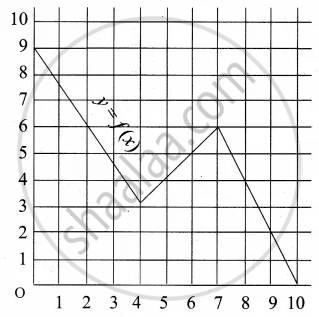Advertisements
Advertisements
Question
Let f : R → R and g : C → C be two functions defined as f(x) = x2 and g(x) = x2. Are they equal functions?
Solution
It is given that
f : R → R and g : C → C are two function defined as f (x) = x2 and g (x) = x2 .
Thus,
domain ( f ) = R and domain ( g ) = C .
Since, domain ( f ) ≠ domain ( g ),
f (x) and g (x) are not equal functions.
APPEARS IN
RELATED QUESTIONS
If f(x) = x2, find `(f(1.1) - f(1))/((1.1 - 1))`
What is the fundamental difference between a relation and a function? Is every relation a function?
Let X = {1, 2, 3, 4} and Y = {1, 5, 9, 11, 15, 16}
Determine which of the set are functions from X to Y.
(a) f1 = {(1, 1), (2, 11), (3, 1), (4, 15)}
If f(x) = x2, find \[\frac{f\left( 1 . 1 \right) - f\left( 1 \right)}{\left( 1 . 1 \right) - 1}\]
Write the range of the real function f(x) = |x|.
If f, g, h are real functions given by f(x) = x2, g(x) = tan x and h(x) = loge x, then write the value of (hogof)\[\left( \sqrt{\frac{\pi}{4}} \right)\] .
Let A and B be two sets such that n(A) = p and n(B) = q, write the number of functions from A to B.
Let f : R → R be defined by f(x) = 2x + |x|. Then f(2x) + f(−x) − f(x) =
The range of the function \[f\left( x \right) = \frac{x^2 - x}{x^2 + 2x}\] is
The domain of definition of the function \[f\left( x \right) = \sqrt{x - 1} + \sqrt{3 - x}\] is
The domain of definition of \[f\left( x \right) = \sqrt{4x - x^2}\] is
The domain of the function \[f\left( x \right) = \sqrt{5 \left| x \right| - x^2 - 6}\] is
The range of the function \[f\left( x \right) = \frac{x + 2}{\left| x + 2 \right|}\],x ≠ −2 is
Which of the following relations are functions? If it is a function determine its domain and range:
{(1, 1), (3, 1), (5, 2)}
Which sets of ordered pairs represent functions from A = {1, 2, 3, 4} to B = {−1, 0, 1, 2, 3}? Justify.
{(1, 1), (2, 1), (3, 1), (4, 1)}
If f(m) = m2 − 3m + 1, find `(("f"(2 + "h") - "f"(2))/"h"), "h" ≠ 0`
Find the domain and range of the following function.
f(x) = `sqrt((x - 2)(5 - x)`
Express the following exponential equation in logarithmic form
54° = 1
Express the following exponential equation in logarithmic form
e–x = 6
Express the following logarithmic equation in exponential form
ln 1 = 0
Find the domain of f(x) = ln (x − 5)
Prove that logbm a = `1/"m" log_"b""a"`
Answer the following:
For any base show that log (1 + 2 + 3) = log 1 + log 2 + log 3
Answer the following:
If `log (("a" + "b")/2) = 1/2(log"a" + log"b")`, then show that a = b
Answer the following:
Find (f ° g) (x) and (g ° f) (x)
f(x) = `x/(x + 1)`, g(x) = `x/(1 - x)`
A graph representing the function f(x) is given in it is clear that f(9) = 2

Describe the following Domain
The data in the adjacent table depicts the length of a person's forehand and their corresponding height. Based on this data, a student finds a relationship between the height (y) and the forehand length (x) as y = ax + b, where a, b are constant.
| Length ‘x’ of forehand (in cm) |
Height 'y' (in inches) |
| 35 | 56 |
| 45 | 65 |
| 50 | 69.5 |
| 55 | 74 |
Find the height of a person whose forehand length is 40 cm
The function f and g are defined by f(x) = 6x + 8; g(x) = `(x - 2)/3`
Calculate the value of `"gg" (1/2)`
The domain of the function f(x) = `sqrtx` is ______.
Find the domain of the following function.
f(x) = `x/(x^2 + 3x + 2)`
Let f and g be two functions given by f = {(2, 4), (5, 6), (8, – 1), (10, – 3)} g = {(2, 5), (7, 1), (8, 4), (10, 13), (11, – 5)} then. Domain of f + g is ______.
Find the domain of the following functions given by f(x) = `1/sqrt(x + |x|)`
Find the domain of the following function given by:
f(x) = `(3x)/(2x - 8)`
Let f(x) = `sqrt(x)` and g(x) = x be two functions defined in the domain R+ ∪ {0}. Find `(f/g)(x)`
The domain and range of real function f defined by f(x) = `sqrt(x - 1)` is given by ______.
The domain for which the functions defined by f(x) = 3x2 – 1 and g(x) = 3 + x are equal is ______.
The domain of the function f(x) = `1/sqrt(|x| - x)` is ______.
If f: R `rightarrow` R be a function defined by f(x) = 4x3 – 7. Then ______.
The period of the function
f(x) = `(sin 8x cos x - sin 6x cos 3x)/(cos 2x cos x - sin 3x sin 4x)` is ______.
Range of the function f(x) = `x/(1 + x^2)` is ______.
